.... He to Whom the kingdom of the heavens and Earth belongs. He does not have a son, and He has no partner in the Kingdom. He created everything, and determined it most exactly. (Surat al-Furqan, 2)
 Believers, whose sole objective in this life is to earn Allah's good pleasure, mercy, and Paradise, and who have a heartfelt submission to Allah, will lead their entire lives for His sake. As outlined in "Say: 'My prayer and my rites, my living and my dying, are for Allah alone, the Lord of all the worlds.'" (Surat al-An'am, 162), they aim to earn Allah's good pleasure in whatever they do and in every instance. They use whatever they possess in their struggle to realize this goal. People who acknowledge all of Allah's attributes; who constantly witness His power, greatness, mercy, love, and compassion; who sense the love of Allah at every moment—their love cannot be compared with any other type of love. Allah describes this love as a "greater" love, while the idolaters' distorted love is described as:
Believers, whose sole objective in this life is to earn Allah's good pleasure, mercy, and Paradise, and who have a heartfelt submission to Allah, will lead their entire lives for His sake. As outlined in "Say: 'My prayer and my rites, my living and my dying, are for Allah alone, the Lord of all the worlds.'" (Surat al-An'am, 162), they aim to earn Allah's good pleasure in whatever they do and in every instance. They use whatever they possess in their struggle to realize this goal. People who acknowledge all of Allah's attributes; who constantly witness His power, greatness, mercy, love, and compassion; who sense the love of Allah at every moment—their love cannot be compared with any other type of love. Allah describes this love as a "greater" love, while the idolaters' distorted love is described as:
Some people set up equals to Allah, loving them as they should love Allah. But those who believe have greater love for Allah. (Surat al-Baqara, 165)
As mentioned in the above verse, some people associate partners with Allah, and love other creatures with the love that they should give only to Him (Surely Allah is beyond this). The believers, on the other hand, know that no person or any part of creation has any innate strength or beauty, for it is Allah Who created all of them from nothing. No living creature can design or prepare its own beauty. The beauty possessed by a person's face or the loveable nature of an animal, their expected life span and time of death, as well as everything else about them is created by Allah, and every beauty is only at His behest. So the believers will love that beauty as it is reflected in people, animals, and nature, being aware of this fact. Subsequently, a believer's love is directly solely toward Allah, Who provides all of these things and Who possesses all things.
Our Prophet (saas) also reminded us that the love we feel among ourselves should be for the sake of Allah:
The best action is to love for the sake of Allah and to hate for the sake of Allah. (Sunan Abu Dawud)
Whoever loves and hates for the sake of Allah, and whoever seals a friendship or declares enmity for His sake, will receive, because of this, Allah's protection. (Sahih Muslim)
Those who associate partners with Allah assume that each person owns his or her own beauty, and so praise that beauty. This is like a person who attends an art show and associates the beauty of the pictures to the artwork, even though the person who deserves this praise is the artist who painted the pictures. Given this truth, people who are confronted with a beautiful view, a pleasant sound, or delicious food should immediately think of our Lord, the Creator of all these beautiful things, and channel the resulting love, pleasure, and thanks to Him. Those who have true faith and, therefore, do not associate partners with Allah, have a strong loving bond with Allah, because they know that everything they own belongs to Him.
Allah informs us that the Prophet Abraham (as) warned his idolatrous community in the following terms:
He [Abraham] said: "You have adopted deities apart from Allah as tokens of mutual affection in this world. But on the Day of Resurrection, you will reject and curse one another. The Fire will be your shelter. You will have no helpers." (Surat al-'Ankabut, 25)
 .... He to Whom the kingdom of the heavens and Earth belongs. He does not have a son, and He has no partner in the Kingdom. He created everything, and determined it most exactly. (Surat al-Furqan, 2) |
Thus, the "affection" between those who associate partners with Allah will ultimately turn into great hatred in the Hereafter. By forgetting His existence, they cause each other to lose their lives' entire objective. In response, Allah turns their idolatrous love and closeness into eternal disgust and malice in the Hereafter.
Thus, the "affection" between those who associate partners with Allah will ultimately turn into great hatred in the Hereafter. By forgetting His existence, they cause each other to lose their lives' entire objective. In response, Allah turns their idolatrous love and closeness into eternal disgust and malice in the Hereafter.
Say: "If your fathers or your sons or your brothers or your wives or your tribe; any wealth you have acquired; or any business you fear may fall into a slump; or any house that pleases you, are dearer to you than Allah and His messenger and striving in His way, then wait until Allah brings about His command. Allah does not guide people who are deviators." (Surat at-Tawba, 24)
 ...on the brink of a crumbling precipice so that it collapses with him into the Fire of Hell? Allah does not love wrongdoers. (Surat at-Tawba, 109) |
Those who have faith acknowledge that all worldly goods belong to Allah and, therefore, love them because they are a manifestation of Him. For example, the greatest love, closeness and friendship they feel will be towards other believers, who display the good morals that Allah is pleased with. This love does not depend on race, nationality, or any other self-interest. Nor does it depend on money, status, culture, or even material worth, for all of these have no real value. Allah describes the love between believers, as follows:
Those who were already settled in the abode [Madinah], and in faith, before they came, love those who have migrated to them; do not find in their hearts any need for what they have been given; and prefer them to themselves, even if they themselves are needy. The people who are safe-guarded from the avarice of their own selves are successful. (Surat al-Hashr, 9)
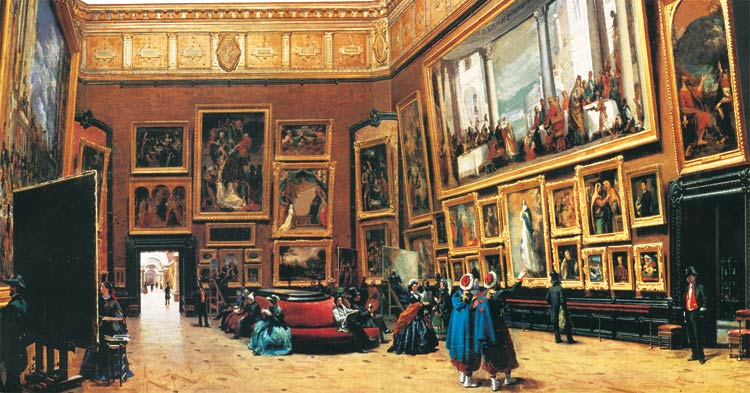 Giuseppe Castiglionne'nin Louvre Müzesi'nde sergilenen "Le Salon Carre" isimli tablosu, 1865. |
As mentioned, believers will accept all other believers as their brothers and sisters. Subsequently, to ensure the believers' well-being, other believers will gladly make the necessary sacrifices to achieve this goal. Such a mutual love is only possible through having faith and living by the Qur'an's morality.
Our Beloved Prophet (saas) stressed the importance of such love and the superior ranking of those believers who live a life with genuine love:
The Prophet (saas) said: "Allah said: 'Those who love one another for My glory will have minbars of light, and the prophets and martyrs will wish that they had the same.'" (At-Tirmidhi)
Allah bestows love, a very significant blessing, upon the believers. We see this in the case of the Prophet John (as), of whom the following is revealed in the Qur'an:
John, take hold of the Book with vigor. We gave him judgment while still a child, and affection and purity from Us—he had fear [and respect]. (Surah Maryam, 12-13)
 ... Handhold. The end result of all affairs is with Allah. (Surah Luqman, 22) |
In another verse, Allah proclaims that He will bestow true love upon the believers who undertake good deeds:
As for those who believe and do right actions, the All-Merciful will bestow His love upon them. (Surah Maryam, 96)
Here we must focus on one other important point: A person who loves for the sake of earning Allah's good approval must love the person who possesses the highest moral qualities, is closest to Allah, and has the highest degree of piety. For this reason, for all believers our Prophet (saas) is the most lovable and closest friend.
 ADNAN OKTAR: "I think more that I am living the perfect destiny ordained for me by Allah. In that way, I am always at ease." True. "Dear Hodja. If something extraordinary and unexpected happens and the results appear to be unwelcome on the surface, how can we still maintain our submission to destiny?" That is exactly where the full beauty and delight lies. In one way, in other words. They are all beautiful through and through, but now [when there is difficulty] it is even more beautiful. In the time of the Messenger of Allah (saas), for instance, and there is a verse of the Qur'an about this, his enemies were coming at them from both sides. They were stuck between them. Some of them began to doubt Allah, may He forbid, when they came under pressure. This is the test. Do you see the test of Almighty Allah? They have faith at first, but when the pressure is on they start to doubt Him. Some start to doubt the Messenger of Allah (saas). They began wondering whether he had deceived or lied to them, may Allah forbid. But some believers say that this is a promise of Allah and the Messenger of Allah (saas) and their faith increases still further. And that is the proper thing. That is where the wheat is distinguished from the chaff. It means that people are tested by adversity. You can take gold and put it in the fire, or silver. The impure part rises to the surface. That part you throw away. But underneath it is pure gold. Allah tests people like that, with fire, with hardship. High-quality, rational, heroic, honest and genuine people are unaffected, and they continue to give thanks to Allah. They give thanks to Allah, and think the best. He is their friend. He is loved madly, passionately, and never abandoned till the end of time. No matter what. They can cut your arms off, your legs off, pluck your eyes out or whatever, but you still call on "Allah" with great love. That is faith. That is love of Allah. There can be no other faith outside this. Insha'Allah. If one loves, then one is completely devoted. We see this in people's lives. They say they are dying of love, and they marry. They say this is love... The man then announces he has gone bankrupt. And things immediately turn in the other direction. The other party then goes off, towards a villa or whatever belonging to someone else. But this is acting in very bad faith. A person does not abandon the beloved until death. Never. How could I ever leave my beloved? Never. Not even under the worst circumstances. You would passionately call Allah and still never abandon. Insha'Allah. Anything else is disloyalty and betrayal. Some women are finished as soon as their man sees them without make-up. Just that alone. They catch cold or flu and the man sees them in that state, and that is enough to end it. Or she gives birth, and the birth changes her. Note that there are a great many post-birth divorces. Divorces always crop up after birth or after accidents. Something happens to her face, for instance. What kind of conscience is that, to leave someone like that? She is a part of you. Allah entrusted her to you. Isn't that right? You can never, ever leave her. She will come to your side in the finest form in Paradise. And how long can a person, a woman stay attractive, in any case? She will in any case grow old. The beauty of old age will come, but those womanly qualities will depart, and that human beauty will come instead. And you will love her like that. Anything else is cruelty. She is also a servant of Allah. You cannot expect her to stay bolt upright for 24 hours a day. She is only human. That would be disloyalty. Someone who loves with the love of Allah loves no matter what. The love of Allah is a profound love. It is a love without end. No matter what. Your hand and face may burn, but you love still more strongly. See how people always get divorced after injury or their loved ones becoming disabled. What kind of conscience is that? How can a person do that? For example, you have devoted 10 or 20 years of your life to someone. It would break one's heart. I cannot even conceive of it. It is truly terrible. The only way is with love and fear of Allah and with profound faith... No such thing can happen in real love and passion. The mad lover never thinks of such things. He never engages in minor calculations. He merely loves as a manifestation of Allah, with passion, and never abandons the object of that love, ever. Not until death. They talk about it, if only they knew real love and passion. But I can tell from the way they talk they do not know it. One can tell from the content of their writings. Because they never mention Allah. How can you love if you never mention Allah? For example, the man drives a Jaguar. He gets out and he looks like Clark Gable. His pockets are stuffed with cash. He says there is a storm raging in his heart. Then he suffers a traffic accident, his car is written off and his hands and face are injured. Love then flies out of the window. Because that love is false. Things are much more fervent with love of and passion for Allah. Imagine that someone's spouse has been crippled or lost an arm… One will love her many times more. Because sympathy then enters the equation, too. Affection then dominates. (Cay TV, October 1, 2009)
ADNAN OKTAR: "I think more that I am living the perfect destiny ordained for me by Allah. In that way, I am always at ease." True. "Dear Hodja. If something extraordinary and unexpected happens and the results appear to be unwelcome on the surface, how can we still maintain our submission to destiny?" That is exactly where the full beauty and delight lies. In one way, in other words. They are all beautiful through and through, but now [when there is difficulty] it is even more beautiful. In the time of the Messenger of Allah (saas), for instance, and there is a verse of the Qur'an about this, his enemies were coming at them from both sides. They were stuck between them. Some of them began to doubt Allah, may He forbid, when they came under pressure. This is the test. Do you see the test of Almighty Allah? They have faith at first, but when the pressure is on they start to doubt Him. Some start to doubt the Messenger of Allah (saas). They began wondering whether he had deceived or lied to them, may Allah forbid. But some believers say that this is a promise of Allah and the Messenger of Allah (saas) and their faith increases still further. And that is the proper thing. That is where the wheat is distinguished from the chaff. It means that people are tested by adversity. You can take gold and put it in the fire, or silver. The impure part rises to the surface. That part you throw away. But underneath it is pure gold. Allah tests people like that, with fire, with hardship. High-quality, rational, heroic, honest and genuine people are unaffected, and they continue to give thanks to Allah. They give thanks to Allah, and think the best. He is their friend. He is loved madly, passionately, and never abandoned till the end of time. No matter what. They can cut your arms off, your legs off, pluck your eyes out or whatever, but you still call on "Allah" with great love. That is faith. That is love of Allah. There can be no other faith outside this. Insha'Allah. If one loves, then one is completely devoted. We see this in people's lives. They say they are dying of love, and they marry. They say this is love... The man then announces he has gone bankrupt. And things immediately turn in the other direction. The other party then goes off, towards a villa or whatever belonging to someone else. But this is acting in very bad faith. A person does not abandon the beloved until death. Never. How could I ever leave my beloved? Never. Not even under the worst circumstances. You would passionately call Allah and still never abandon. Insha'Allah. Anything else is disloyalty and betrayal. Some women are finished as soon as their man sees them without make-up. Just that alone. They catch cold or flu and the man sees them in that state, and that is enough to end it. Or she gives birth, and the birth changes her. Note that there are a great many post-birth divorces. Divorces always crop up after birth or after accidents. Something happens to her face, for instance. What kind of conscience is that, to leave someone like that? She is a part of you. Allah entrusted her to you. Isn't that right? You can never, ever leave her. She will come to your side in the finest form in Paradise. And how long can a person, a woman stay attractive, in any case? She will in any case grow old. The beauty of old age will come, but those womanly qualities will depart, and that human beauty will come instead. And you will love her like that. Anything else is cruelty. She is also a servant of Allah. You cannot expect her to stay bolt upright for 24 hours a day. She is only human. That would be disloyalty. Someone who loves with the love of Allah loves no matter what. The love of Allah is a profound love. It is a love without end. No matter what. Your hand and face may burn, but you love still more strongly. See how people always get divorced after injury or their loved ones becoming disabled. What kind of conscience is that? How can a person do that? For example, you have devoted 10 or 20 years of your life to someone. It would break one's heart. I cannot even conceive of it. It is truly terrible. The only way is with love and fear of Allah and with profound faith... No such thing can happen in real love and passion. The mad lover never thinks of such things. He never engages in minor calculations. He merely loves as a manifestation of Allah, with passion, and never abandons the object of that love, ever. Not until death. They talk about it, if only they knew real love and passion. But I can tell from the way they talk they do not know it. One can tell from the content of their writings. Because they never mention Allah. How can you love if you never mention Allah? For example, the man drives a Jaguar. He gets out and he looks like Clark Gable. His pockets are stuffed with cash. He says there is a storm raging in his heart. Then he suffers a traffic accident, his car is written off and his hands and face are injured. Love then flies out of the window. Because that love is false. Things are much more fervent with love of and passion for Allah. Imagine that someone's spouse has been crippled or lost an arm… One will love her many times more. Because sympathy then enters the equation, too. Affection then dominates. (Cay TV, October 1, 2009)
 .... Allah's guidance, that is true guidance. We are commanded to submit as Muslims to the Lord of all the worlds. (Surat al-An'am, 71) Do those who do not believe imagine that they can take My servants as protectors instead of Me? We have prepared Hell as hospitality for the unbelievers! (Surat al-Kahf, 102) |
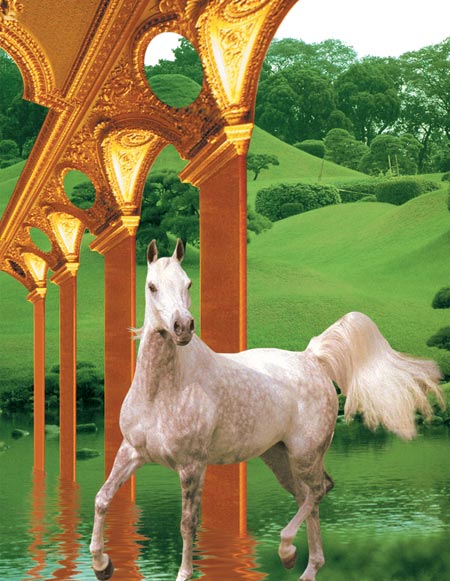 They worship besides Allah something for which no authority has come down, something about which they have no knowledge. There is no helper for the wrongdoers. (Surat al-Hajj, 71) |
People who devote themselves wholeheartedly to Allah feel within themselves a sense of love and excitement when confronted with all of the beautiful things He has created: a flower, a butterfly, a bird, a cat, or even a beautiful landscape. Similarly, people who adhere to the Qur'an's morals or a person with a face pleasing to look at will stir sincere amazement, because whatever they see they regard as Allah's manifestation. The ebullient love felt toward Allah will bring forth a natural affection and love in their souls for anything His eternal beauty, masterpiece, wisdom and power are manifest. Only such people experience "true" love in the spiritual sense.
We do not associate anything with Allah. That is how Allah has favored us and all of humanity, but most do not give thanks.
(Surah Yusuf, 38)
Qur'anic moral values form the basis of true love, for only they can inspire a person to love someone else deeply with his or her morals, personality, and all individual characteristics. By leading such a life, which earns them Allah's good pleasure, they will acquire many loveable, beautiful characteristics. Knowing that "In your Lord's Sight, right actions which are lasting are better both in reward and end result" (Surah Maryam, 76), they persevere in all of these beautiful moral characteristics. Such qualities as faithfulness, truthfulness, respect, love, humbleness, sacrifice, honesty, tolerance, forgiveness, mercy, a soft nature, and bravery can be constant only through living a life of awe and respect for Allah and adhering to the Qur'an's moral values. The same applies to love. The basis for this love is having faith and respect for Allah and internalizing the Qur'an's morals, both of which will cause them to love others for the sake of Allah with a strong and deep love. The resulting friendships with other believers will, in the Hereafter, lead to eternal friendships.
A sincere believer's superior level of moral values will ensure his or her high regard in Allah's Presence and in the sight of fellow believers. Such believers will expect and hope only for Allah's love and good pleasure. In return, Allah will ensure that these believers are loved by Him, as well as other believers, that they will be granted a light and beauty, and that other people will have warm feelings for them.
 ADNAN OKTAR: Masha'Allah, people normally think of religious statements as moral statements about very plain issues, and there are various aspects they don't concentrate on much. The fact is there are many secrets in religion. One of these is patience. Thanks to patience people live extremely comfortably and, patience totally eliminates all the obstacles to true love. Without patience, human beings are very sensitive entities, they will finish friendships in just 15 minutes, not even half an hour, when they become fixated with something someone said, a lack of concern on their part or any answers they may have given on any subject. That is enough for them to finish it. They can come up with the most terrible distortions. They can misunderstand something perfectly reasonable or the other party, who may actually be open to real love, can really behave unreasonably, doing it once or twice. They can lose such people in an instant. For that reason it seems almost impossible to maintain the bonds of true love among people, and this can be seen only very, very rarely. In other words, many people in the world face this problem. If you ask, as I was saying just yesterday, they will say they have one real friend, or maybe two, that is all. One needs great care and attention for true love to flourish, because unless people are very wise, very careful and attentive, and unless they know the other person really well, they will constantly clash and begin to behave in a way that they find repulsive. Ignorance, for instance, has a very negative effect on people, but a wise person avoids ignorance, and knows that if he loves the other person he can educate that ignorance and increase their store of knowledge. But people do not regard ignorance as important. Yet it has a huge negative effect. Irrationality has a negative effect, but one can educate ignorance out of people if one loves. The important thing is to decide to love. If you educate someone, their ignorance can vanish, irrationality can vanish, because once one follows the Qur'an one also becomes highly rational. One has to educate them patiently, and direct them in such a way that they will love Allah. It is very dangerous to try and make someone love you; that is always futile in the end. That is how it is. But someone who causes another to love Allah also makes them love him. In other words, one needs to direct people to the source of true love, not to insist that they love us. Once they love Allah, they will love the other person as a manifestation of Allah. (Kayseri TV, November 22, 2009)
ADNAN OKTAR: Masha'Allah, people normally think of religious statements as moral statements about very plain issues, and there are various aspects they don't concentrate on much. The fact is there are many secrets in religion. One of these is patience. Thanks to patience people live extremely comfortably and, patience totally eliminates all the obstacles to true love. Without patience, human beings are very sensitive entities, they will finish friendships in just 15 minutes, not even half an hour, when they become fixated with something someone said, a lack of concern on their part or any answers they may have given on any subject. That is enough for them to finish it. They can come up with the most terrible distortions. They can misunderstand something perfectly reasonable or the other party, who may actually be open to real love, can really behave unreasonably, doing it once or twice. They can lose such people in an instant. For that reason it seems almost impossible to maintain the bonds of true love among people, and this can be seen only very, very rarely. In other words, many people in the world face this problem. If you ask, as I was saying just yesterday, they will say they have one real friend, or maybe two, that is all. One needs great care and attention for true love to flourish, because unless people are very wise, very careful and attentive, and unless they know the other person really well, they will constantly clash and begin to behave in a way that they find repulsive. Ignorance, for instance, has a very negative effect on people, but a wise person avoids ignorance, and knows that if he loves the other person he can educate that ignorance and increase their store of knowledge. But people do not regard ignorance as important. Yet it has a huge negative effect. Irrationality has a negative effect, but one can educate ignorance out of people if one loves. The important thing is to decide to love. If you educate someone, their ignorance can vanish, irrationality can vanish, because once one follows the Qur'an one also becomes highly rational. One has to educate them patiently, and direct them in such a way that they will love Allah. It is very dangerous to try and make someone love you; that is always futile in the end. That is how it is. But someone who causes another to love Allah also makes them love him. In other words, one needs to direct people to the source of true love, not to insist that they love us. Once they love Allah, they will love the other person as a manifestation of Allah. (Kayseri TV, November 22, 2009)
People who do not follow the Qur'an's morals have an incorrect understanding of love. No matter how much they believe that they are leading a life full of love and respect toward others, these interactions are, in general, based on inappropriate and misleading bases. We will now examine some of these below.
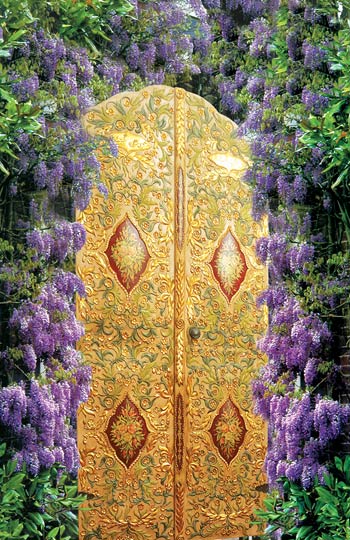 You consider them united, but their hearts are scattered wide. That is because they are people who do not use their intellect. |
Examples of love based on idolatrous thinking are easily found in relationships between men and women. Some people channel their love and devotion toward other people who are, in essence, weak, instead of channeling it toward Allah. Sometimes, they make another person their life's aim, mention their name whenever possible, and try to gain their love. This person will be the focus of their attention for the whole day. Or, they think about this person all night and thus cannot sleep. Instead of seeking Allah's good pleasure, they will struggle to please only that particular person, even if this means that they have to do something that violates the Qur'an's morals and the limits that Allah has established for humanity. They will make any sacrifice for that person, but exert no effort to gain Allah's good pleasure. In other words, they transform the objects of their attention into little deities. This is why some romantic poems, writings, or even discussions claim that the author "worships" the object of his or her affection. Such an erroneous understanding of love, which associates others with Allah, is prohibited, for one's love of Allah is a much stronger and superior type of love:
Remember Allah as you used to remember your forefathers—or even more. (Surat al-Baqara, 200)
 It is not fitting for a Prophet to take captives until he has let much blood in the land. You desire the goods of the dunya, whereas Allah desires the akhira. Allah is Almighty, All-Wise. (Surat al-Anfal,67) |
If someone loves anything else, whether a person, a thing, or an idea, more than he or she loves Allah, he or she will fall into idolatry and draw near to Hell. Surprisingly, many people do not see the truth of this statement and so continue in their idolatry.
Obviously, loving other people, being concerned about their welfare, and lovingly protecting their families and relatives are admirable deeds and are blessings bestowed upon people by Allah. Such love, when it is based upon love for Allah, ensures that person will attain happiness in both worlds. If such love is not based upon love for Allah, the people will experience pain and agony in both worlds. Allah informs us that this second group of people will, in the Hereafter, try to ransom their way out of Hell by offering each other in payment:
An evildoer will wish he could ransom himself from the punishment of that Day by means of his sons, his wife, his brother, or his family who sheltered him, or everyone else on Earth, if that only meant that he could save himself. (Surat al-Ma'arij, 11-14)
The Day a man will flee from his brother, his mother, his father, and his wife and children. On that Day, every man among them will have concerns enough of his own. (Surah 'Abasa, 34-37)
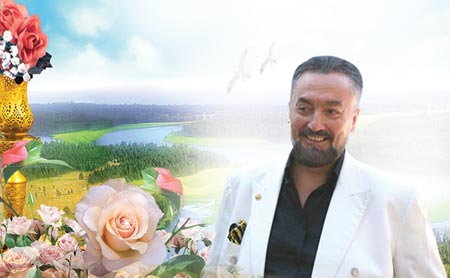 ADNAN OKTAR: Allah knows the truth, of course. But if a person's heart is muddy and dirtied in this world, then he becomes unable to take pleasure in anything. The beauty of a flower, of a piece of fruit or a woman, all become technical beauty for him, meaning that his soul loses the profundity of passion. And this is a terrible affliction. There is a huge difference between love and real love. I mean, one person says he is in love with another, but the next day they break up in a great scuffle. These loves are all imitations. None is real love. They are all based on self-interest, on tactics, on imitation, on a copy of romanticism. Whereas in real love there is depth, passion and love of Allah. And since a person sees that as a manifestation of Allah, he experiences an ineffably intense desire. This can sometimes become quite unbearable, in proportion to a person's strength, faith and intelligence. In other words, it turns into a delight that rocks the soul. We call this passion. It is a very, very great blessing for people to experience it. It can only be achieved with love and fear of Allah, honesty and profundity. The Qur'an refers to those who lose that love, passion and beauty in the absence of those things. (Ekin TV; 26 January 2009)
ADNAN OKTAR: Allah knows the truth, of course. But if a person's heart is muddy and dirtied in this world, then he becomes unable to take pleasure in anything. The beauty of a flower, of a piece of fruit or a woman, all become technical beauty for him, meaning that his soul loses the profundity of passion. And this is a terrible affliction. There is a huge difference between love and real love. I mean, one person says he is in love with another, but the next day they break up in a great scuffle. These loves are all imitations. None is real love. They are all based on self-interest, on tactics, on imitation, on a copy of romanticism. Whereas in real love there is depth, passion and love of Allah. And since a person sees that as a manifestation of Allah, he experiences an ineffably intense desire. This can sometimes become quite unbearable, in proportion to a person's strength, faith and intelligence. In other words, it turns into a delight that rocks the soul. We call this passion. It is a very, very great blessing for people to experience it. It can only be achieved with love and fear of Allah, honesty and profundity. The Qur'an refers to those who lose that love, passion and beauty in the absence of those things. (Ekin TV; 26 January 2009)
Some relationships, whether consciously or subconsciously, are based on self-interest. Some people, who feel an excitement when they meet a person whom they hope to benefit from, interpret this excitement as "love." However, in truth it is no more than an "affected desire" for what that person has. In fact, such love often depends on the level of the "loved" person's wealth and status. Wealth excites people, and thus the most excitement is felt towards the wealthiest person. As mentioned above, this type of excitement is nothing but an attachment to worldly interests. Rich people are not "loved" primarily for their morals and characteristics, and thus always seem to have many "friends" even if they are easily angered, rude, selfish, illogical, merciless, always looking for gain, insincere, or even thoughtless.
Some people want to be with those who entertain them: "A person who likes me should be able to make me laugh." As a result, any resulting closeness is based on a deluded self-interest, for enjoying to be with a person who makes you laugh and feel happy is not the same as loving that person. However, because many people mistake the relief they feel for having gained something for love, they claim that they love that person very much.
Other people assume that being around good people will raise their esteem. As a result, they will select "good" people to befriend, considering their physical features such as height, the color of their eyes and hair. Often, such people can see only the other person's physical beauty, not their intelligence, conscience, or characteristics. They do not consider these aspects important because they claim that their love has "blinded" them. However, this "love" means "I love the esteem this person's beauty earns me." Apart from that person's beauty, his or her spirit does not mean anything to them. Just because he or she is beautiful, many inappropriate and undesirable particularities such as being merciless, insensitive, or scornful may totally be ignored.
Another important type of self-interest is trying to secure one's future by getting married. Many people fear living alone, being unable to support themselves, or of having no one to look after them when they are sick. Some people seek to abolish all such fears by getting married. For this reason, they attach themselves to the most promising person in this regard and convince themselves that they have fallen in "love."
For the rest of their lives, they share their pains and complaints about their spouse with their neighbors and relatives. But when asked why they stay with that person, they claim to love them very much. However, the Qur'an and its value system say that love should expect nothing in return. People should love other people sincerely, which involves personal sacrifice and expecting nothing in return, for that person is a manifestation of Allah. They should never backbite, but, as a result of this sincere love, should only speak well of them. They don't obligatorily "tolerate" the others for they treat one another with compassion and mercy, cover up their misgivings, try to make them feel at ease, and respond to every need as best as they can. Sincere love, friendship and closeness are best demonstrated through these actions.
Love that is not based on the Qur'an will inevitably be short-term in nature. For example, it is quite normal for people to dislike or feel upset with others when they realize that they cannot attain any benefit from that person. Similarly, those whom some people formerly claimed to love become people that they have to tolerate if they have experienced some physical problem. For example, they might no longer love a person if he or she somehow becomes disfigured by an accident or an illness. A "perfect" couple's marriage might collapse overnight when one spouse becomes terminally ill, experiences some personal or professional disaster, or is no longer as beautiful or as rich as before. Sometimes, despite the spouse's physical beauty or wealth, the couple divorces because they no longer "love" the other person after witnessing his or her weakness during the illness. Similarly, although they seemed to get along well in the days when they possessed wealth and riches, some people inevitably lose the love and closeness they used to feel towards each other when their respective wealth and riches is dwindled away.
In essence, true love should never diminish, but should only increase with the passage of time. A person who values another person for his moral values finds that her love for him will increase as his good characteristics become ever more apparent. Even if this same person is left crippled, broke, or physically repellant, her love for him does not diminish. These hardships may, in effect, increase a person's modesty and maturity and thereby make him a better and more moral person. As a result, their love for each other only grows stronger. These hardships have no effect on true love because true love is based on the Qur'an's morals and the desire to earn Allah's good pleasure by obeying the limits that He has established for humanity.
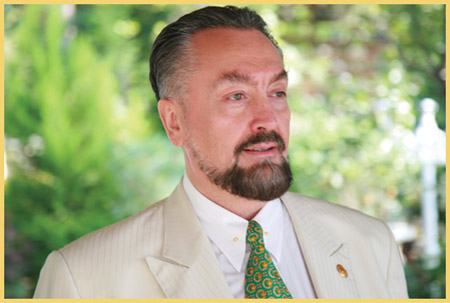 ADNAN OKTAR: That is why there is a lack of love in the world. I watch foreign channels, and all these models and artists and the like. I follow them all very closely and look at their lives to a greater or lesser extent. I see that not a single one has known true love. That emptiness, meaninglessness on those women's faces. He says how happy they are to have found one another, while the woman looks like stone. Is that how it should be? And they fight over the slightest things. They split up over the slightest things. But the worst thing of all is the prenuptial agreement. If you divorce me, they say, you will have to pay me this much and do this and that. But if there is the slightest possibility of divorce, why get married in the first place? Why divorce someone one loves? You intend to stay together for ever. She is a manifestation of Allah. How can one leave one's beloved? You can only leave her, may Allah forbid, if she abandons faith and the religion or commits a gross immorality and you cannot control her, and you have no other alternative. May Allah forbid. Otherwise, one can never abandon one's spouse. They are the manifestation of Allah. Allah has punished the whole world. Or 99% of the world. He has inflicted this punishment on at least 99% in this world. Allah has taken love away from people. Those who get married perform marriages of convenience. They cannot enjoy marriages based on passion, love and love of Allah.
ADNAN OKTAR: That is why there is a lack of love in the world. I watch foreign channels, and all these models and artists and the like. I follow them all very closely and look at their lives to a greater or lesser extent. I see that not a single one has known true love. That emptiness, meaninglessness on those women's faces. He says how happy they are to have found one another, while the woman looks like stone. Is that how it should be? And they fight over the slightest things. They split up over the slightest things. But the worst thing of all is the prenuptial agreement. If you divorce me, they say, you will have to pay me this much and do this and that. But if there is the slightest possibility of divorce, why get married in the first place? Why divorce someone one loves? You intend to stay together for ever. She is a manifestation of Allah. How can one leave one's beloved? You can only leave her, may Allah forbid, if she abandons faith and the religion or commits a gross immorality and you cannot control her, and you have no other alternative. May Allah forbid. Otherwise, one can never abandon one's spouse. They are the manifestation of Allah. Allah has punished the whole world. Or 99% of the world. He has inflicted this punishment on at least 99% in this world. Allah has taken love away from people. Those who get married perform marriages of convenience. They cannot enjoy marriages based on passion, love and love of Allah.
REPORTER: What is the reason for this punishment?
ADNAN OKTAR: They have forgotten Allah, and turned to Darwinism and materialism. They look at the women they marry as a kind of ape, an animal descended from the apes, and as an animal that will one day cease to exist. They regard them as apes with a bit of hair on their heads, with hands and feet. As a kind of more advanced ape. They think of them as two apes living in the same house. They say that they are living in a house in the same way that apes used to live in caves, but that they are slightly more advanced. Can there be any love, passion or depth in such a situation? Is that possible? And I see fine young people behaving like robots. I look at girls and women and they are completely mechanical. I look at the fashion models. There is not the slightest spark of passion in their faces. They say, let's get married. What job do you do? How nice. Do you have a car? Yes, comes the answer. Then they suddenly say they feel love for the other person, an ineffable love. The depth of that love grows with the list of their possessions. They now say they feel a mad love. Then the man says he is awfully sorry, but he has gone bust. Three days later she will suggest they go their separate ways. Easy come, easy go. They go where the money is, where the flesh is.
REPORTER: These are the effects of materialism.
ADNAN OKTAR: Of course. They get married on the basis of people's looks. Then they find someone better looking. They get married for money, but then they find someone a bit richer, and when he winks at them, off they go. Or for someone's work. The man may be an engineer, but when she finds a chief engineer she goes off with him. Whatever they get married for, that is who they go off with. That is why no real love can develop, no real passion. Allah has inflicted a terrible scourge on the world. I mean, the world is meaningless without love. In that event, all that is left is the daily grind; eating, watching TV, going to bed, getting up again, having a bath, eating again, going to bed, getting up again and going off to work. Work is like a prison for them. A mass of concrete; the office, concrete to right and left and over their heads. They put a computer in front of them. And they slave away from 8 in the morning until who knows when in the evening. They then come home, to another concrete box. There they eat, wash the dishes and clothes, then they fight and go to sleep. Then in the morning they eat once again and go back to those concrete boxes. This goes on for 30 years. Then they retire. Then once they have retired they just spend their time in one cardboard box. What life is that? Is that why we come into this world? That is just sheer misery.
REPORTER: This applies to the whole world at the moment, but...
ADNAN OKTAR: It is another way of saying misery. One cannot live like that. One must burn with love, burn with passion, with a mad passion. But once one has that, then even a really tiny place can be utterly delightful with a mad passion. You look at a frog for example, and you feel affection for it, you see an ant and watch it with a deep love as a manifestation of Allah. Because those tiny little legs move about so, and then it starts cleaning its own head. Where did that tiny creature learn to groom itself? And they shine as if covered in lacquer. All the features of its body and all the generations to follow are encoded in a tiny space at the end of its feet. There are ants that have been preserved in amber and that date back 100 or 120 million years, and that are identical to ants today and have never changed. But these things are only beautiful if looked at with a love of Allah. (Tempo TV, September 21, 2009)
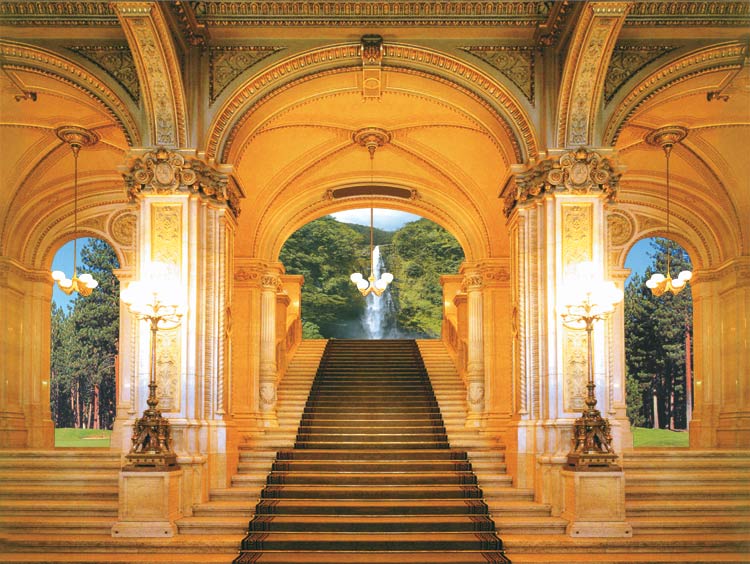 Allah expands and restricts provision to anyone He wills. They rejoice in the life of this world. Yet the life of this world, compared to the Hereafter, is only fleeting enjoyment. As for anyone who desires this fleeting existence, We hasten in it whatever We will to whoever We want. Then We will consign him to Hell, where he will roast, reviled and driven out. |